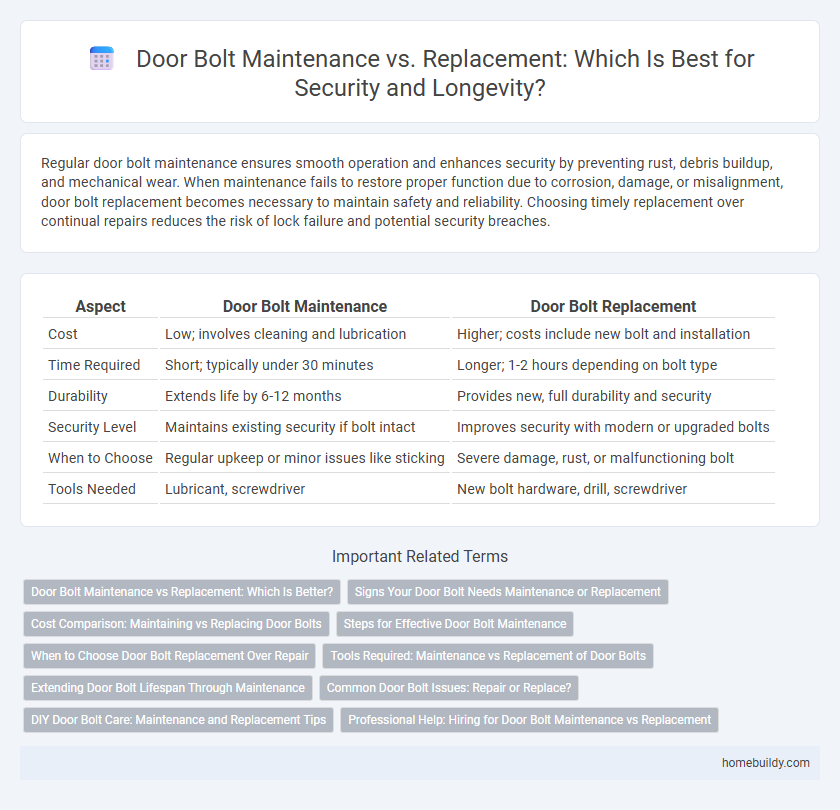Regular door bolt maintenance ensures smooth operation and enhances security by preventing rust, debris buildup, and mechanical wear. When maintenance fails to restore proper function due to corrosion, damage, or misalignment, door bolt replacement becomes necessary to maintain safety and reliability. Choosing timely replacement over continual repairs reduces the risk of lock failure and potential security breaches.
Table of Comparison
| Aspect | Door Bolt Maintenance | Door Bolt Replacement |
|---|---|---|
| Cost | Low; involves cleaning and lubrication | Higher; costs include new bolt and installation |
| Time Required | Short; typically under 30 minutes | Longer; 1-2 hours depending on bolt type |
| Durability | Extends life by 6-12 months | Provides new, full durability and security |
| Security Level | Maintains existing security if bolt intact | Improves security with modern or upgraded bolts |
| When to Choose | Regular upkeep or minor issues like sticking | Severe damage, rust, or malfunctioning bolt |
| Tools Needed | Lubricant, screwdriver | New bolt hardware, drill, screwdriver |
Door Bolt Maintenance vs Replacement: Which Is Better?
Door bolt maintenance ensures longevity and optimal security by regularly lubricating moving parts and checking for wear, preventing costly replacements. Replacement becomes necessary when the bolt is severely corroded, damaged, or malfunctioning, compromising door security. Choosing maintenance over replacement is often more cost-effective but requires consistent attention to avoid unexpected failures.
Signs Your Door Bolt Needs Maintenance or Replacement
Signs your door bolt needs maintenance include difficulty turning the bolt, unusual noises like squeaking or grinding, and visible rust or corrosion. Replacement becomes necessary when the door bolt is bent, broken, or consistently fails to secure the door properly, compromising safety. Regular inspections every six months help detect wear and tear, ensuring timely maintenance or replacement to maintain optimal door security.
Cost Comparison: Maintaining vs Replacing Door Bolts
Maintaining door bolts typically involves minimal costs such as lubrication, tightening screws, and occasional part adjustments, often amounting to under $20 annually. Replacing door bolts incurs higher expenses including the price of new hardware, which can range from $30 to $150 depending on the model and quality, plus potential labor costs if professional installation is required. Over time, regular maintenance proves more cost-effective by extending the lifespan of existing bolts, while replacement becomes necessary only when bolts are severely damaged or malfunctioning.
Steps for Effective Door Bolt Maintenance
Regular lubrication of the door bolt mechanism with graphite or silicone spray prevents rust and ensures smooth operation. Inspecting the bolt and strike plate for alignment and tightening loose screws enhances security and functionality. Replacing worn or damaged components during maintenance avoids costly door bolt replacement and extends the lifespan of the locking system.
When to Choose Door Bolt Replacement Over Repair
Door bolt replacement is recommended when the bolt mechanism is severely corroded, damaged, or misaligned beyond repair, compromising security and functionality. Regular maintenance like lubrication and tightening extends bolt lifespan, but persistent jamming or excessive wear signals the need for replacement. Choosing door bolt replacement ensures enhanced durability and reliable locking performance, especially for high-security applications.
Tools Required: Maintenance vs Replacement of Door Bolts
Maintaining a door bolt typically requires basic tools such as a screwdriver, lubricant, and cleaning cloth to ensure smooth operation and prevent rust. Replacing a door bolt demands more specialized tools, including a drill, chisel, measuring tape, and possibly replacement screws or bolts to fit the new hardware correctly. Proper tool selection impacts the efficiency and success of either maintenance or replacement tasks for door bolts.
Extending Door Bolt Lifespan Through Maintenance
Regular lubrication and cleaning of door bolts prevent rust and ensure smooth operation, significantly extending their lifespan. Inspecting and tightening loose screws or mounting hardware reduces wear and minimizes the risk of bolt misalignment. Timely maintenance delays the need for costly door bolt replacement by preserving the structural integrity and functionality of the locking mechanism.
Common Door Bolt Issues: Repair or Replace?
Common door bolt issues such as misalignment, rusting, or jamming often require maintenance like lubrication, tightening screws, or realigning the bolt to restore functionality. Persistent problems including severe corrosion, broken components, or frequent failure signal the need for door bolt replacement to ensure security and proper operation. Evaluating the extent of damage and the cost-effectiveness of repair versus replacement helps determine the best course of action for maintaining door integrity.
DIY Door Bolt Care: Maintenance and Replacement Tips
Regular lubrication and tightening of screws can extend the lifespan of door bolts, preventing rust and ensuring smooth operation. Inspecting the bolt for signs of wear, such as bending or corrosion, helps determine when replacement is necessary for security. DIY door bolt care requires basic tools like a screwdriver, lubricant spray, and sometimes a replacement bolt matching the door's specifications.
Professional Help: Hiring for Door Bolt Maintenance vs Replacement
Professional help ensures accurate assessment of door bolt conditions, where maintenance involves cleaning, lubrication, and minor adjustments to extend lifespan. Hiring experts for door bolt replacement guarantees proper installation, enhanced security, and compatibility with existing door hardware. Choosing specialized locksmiths or technicians reduces risks of malfunction and improves overall door safety and durability.
Door bolt maintenance vs door bolt replacement Infographic

 homebuildy.com
homebuildy.com